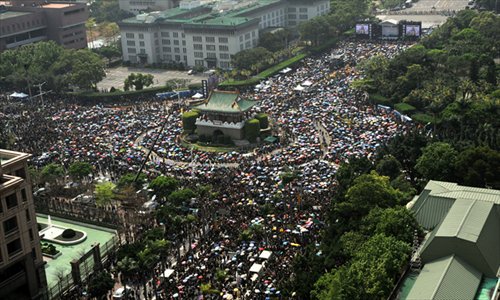Protests blot Taiwan image

Protesters gather to join a demonstration against a cross-Straits service trade agreement in front of the Taiwan leader's official residence in Taipei on Sunday. Photo: AFP
Thousands of protesters on Sunday took to the streets in Taipei in renewed protest against a cross-Straits service trade agreement, amid an ongoing student campaign that paralyzed Taiwan's legislative authority.
The campaign, which saw a clash between students and riot police outside the "Executive Yuan" a week ago, has caused second thoughts over the island's democratic system by some Chinese mainland intellectuals and members of the public, who viewed Taiwan as a "laboratory of democracy."
The sit-in began at 1 pm on Sunday when the crowd, dressed in black shirts, gathered along Ketagalan Boulevard and nearby streets close to the office of Taiwan leader Ma Ying-jeou.
More than 110,000 people from different social backgrounds attended, local police said on Sunday afternoon. Lin Fei-fan, a student leader and organizer of protestors, claimed that the number exceeded 500,000, Taipei-based Eastern Television reported.
Su Tseng-chang, chairman of the opposition Democratic Progressive Party (DPP), along with Tsai Ing-wen,
former chairwoman of the DPP, and several other major DPP members also put on black shirts and arrived to support the protest, Eastern Television reported.
Not far from the demonstration, another group of people holding carnations also rallied outside Taipei's main railway station on Sunday, calling for an end to the occupation and for social stability.
Ma Ying-jeou on Saturday addressed the student demands in a televised speech. He accepted the demands to review the trade pact clause by clause and introduce a mechanism to oversee all cross-Straits deals, but declined to retract the pact altogether.
However, the response was seen as inadequate and Lin noted that they were left with no alternative but to launch a "peaceful but firm" rally, reported the Taipei-based Central News Agency.
"As our leader, Ma should listen to public opinion instead of following suggestions from a few officials. Only those with vested interests would support the agreement. I am here to show my support to our campaign so that Taiwan will not be economically controlled by the mainland," Chiang Kun-hung, a 33 year-old protester, told the Global Times on Sunday.
There has been much criticism since the occupation of the "Legislative Yuan" started two weeks ago. Some analysts pointed out that the protests are a result of disputes over the status of Taiwan instead of economic concerns, given some political factions' growing wariness over the mainland's influence in the island due to closer exchanges.
"Protest organizers are trying to incite support for Taiwan's independence. That is their real political appeal," said Li He, a deputy director of the Beijing-based National Society of Taiwan Studies.
Li told the Global Times that the ideological conflicts between pro-mainland and anti-mainland factions have long afflicted Taiwan's politics, making it more complicated than divided opinions over policies.
Some also see the violent and chaotic movement as street politics that reflect flaws in Taiwan's democracy.
"Ma has obviously made concessions to negotiate with protesters and give consideration to public opinion about the agreement. Politics is the art of comprise in exchange for consensus. The student reaction is not in line with the common rule of a democratic society," Tong Zongjin, a law professor at the China University of Political Science and Law, told the Global Times.
Some in the mainland have viewed Taiwan as a "laboratory of democracy." During the island's leadership election in early 2012, mainland intellectuals and Net users closely followed the poll with curiosity, and some of them marveled at the qualities exhibited by both Ma and his opponent Tsai during the election.
Zheng Dongyang, a mainland media commentator, was among those who went to Taiwan to observe the 2012 leadership election.
In an opinion piece posted on news portal ifeng.com, Zheng said the occupation of Taiwan's "Legislative Yuan" has caused some reflections on social media in the mainland.
"There are a number of people like me who love Taiwan. We often ponder over the reform that Taiwan has gone through and sum up experience for the mainland's development. However, we are disappointed by the protest this time," Zheng wrote.